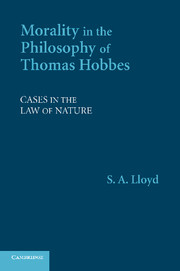Book contents
- Frontmatter
- Contents
- Preface
- Introduction
- PART ONE MORAL PHILOSOPHY, METHOD AND MATTER
- PART TWO FROM PSYCHOLOGY TO MORAL PHILOSOPHY
- PART THREE FROM MORAL PHILOSOPHY TO CIVIL PHILOSOPHY
- 6 Self-Effacing Natural Law and the Duty to Submit to Government
- 7 Fools, Hypocrites, Zealots, and Dupes: Civic Character and Social Stability
- 8 The Unity of Practical Wisdom
- Bibliography
- Index
6 - Self-Effacing Natural Law and the Duty to Submit to Government
Published online by Cambridge University Press: 30 September 2009
- Frontmatter
- Contents
- Preface
- Introduction
- PART ONE MORAL PHILOSOPHY, METHOD AND MATTER
- PART TWO FROM PSYCHOLOGY TO MORAL PHILOSOPHY
- PART THREE FROM MORAL PHILOSOPHY TO CIVIL PHILOSOPHY
- 6 Self-Effacing Natural Law and the Duty to Submit to Government
- 7 Fools, Hypocrites, Zealots, and Dupes: Civic Character and Social Stability
- 8 The Unity of Practical Wisdom
- Bibliography
- Index
Summary
King: Methinks I could not die anywhere so contented as in the king's company, his cause being just and his quarrel honorable.
Williams : That's more than we know.
Bates: Ay, or more than we should seek after, for we know enough if we know we are the king's subjects. If his cause be wrong, our obedience to the king wipes the crime of it out of us.
(Shakespeare, Henry V, Act IV, Scene 1)[I]f I wage war at the commandment of my prince, conceiving the war to be unjustly undertaken, I do not therefore do unjustly; but rather if I refuse to do it, arrogating to myself the knowledge of what is just and unjust, which pertains only to my prince.
(EW II, 152)In order to understand how Hobbes thought the Law of Nature dictates submission to an absolute sovereign, we need to consider his view of the relation between natural law and civil law, and how his notion of what I shall call a hierarchy of responsibility harmonizes that relation. We will also need to sort out some puzzles about how liberty, law, and obligation are to be reconciled within Hobbes's system. Those are the tasks of the current chapter, and they must be successfully completed if the reciprocity interpretation is to satisfy the desideratum laid down in Chapter 4, that an adequate interpretation of Hobbes's moral philosophy must explain precisely, and in a plausible way, how the Law of Nature directs us to submit to the rule of an unlimited sovereign power.
- Type
- Chapter
- Information
- Morality in the Philosophy of Thomas HobbesCases in the Law of Nature, pp. 263 - 294Publisher: Cambridge University PressPrint publication year: 2009



